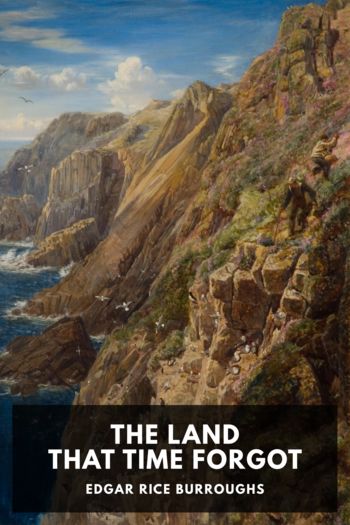South!, Ernest Shackleton [good books to read in english TXT] 📗

- Author: Ernest Shackleton
Book online «South!, Ernest Shackleton [good books to read in english TXT] 📗». Author Ernest Shackleton
The next thing was to get the stores and ballast out of the boat, in order that we might secure her for the night. We carried the stores and gear above high-water mark and threw out the bags of sand and the boulders that we knew so well. Then we attempted to pull the empty boat up the beach, and discovered by this effort how weak we had become. Our united strength was not sufficient to get the James Caird clear of the water. Time after time we pulled together, but without avail. I saw that it would be necessary to have food and rest before we beached the boat. We made fast a line to a heavy boulder and set a watch to fend the James Caird off the rocks of the beach. Then I sent Crean round to the left side of the cove, about thirty yards away, where I had noticed a little cave as we were running in. He could not see much in the darkness, but reported that the place certainly promised some shelter. We carried the sleeping-bags round and found a mere hollow in the rock-face, with a shingle floor sloping at a steep angle to the sea. There we prepared a hot meal, and when the food was finished I ordered the men to turn in. The time was now about 8 p.m., and I took the first watch beside the James Caird, which was still afloat in the tossing water just off the beach.
Fending the James Caird off the rocks in the darkness was awkward work. The boat would have bumped dangerously if allowed to ride in with the waves that drove into the cove. I found a flat rock for my feet, which were in a bad way owing to cold, wetness, and lack of exercise in the boat, and during the next few hours I laboured to keep the James Caird clear of the beach. Occasionally I had to rush into the seething water. Then, as a wave receded, I let the boat out on the alpine rope so as to avoid a sudden jerk. The heavy painter had been lost when the sea-anchor went adrift. The James Caird could be seen but dimly in the cove, where the high black cliffs made the darkness almost complete, and the strain upon one’s attention was great. After several hours had passed I found that my desire for sleep was becoming irresistible, and at 1 a.m. I called Crean. I could hear him groaning as he stumbled over the sharp rocks on his way down the beach. While he was taking charge of the James Caird she got adrift, and we had some anxious moments. Fortunately, she went across towards the cave and we secured her, unharmed. The loss or destruction of the boat at this stage would have been a very serious matter, since we probably would have found it impossible to leave the cove except by sea. The cliffs and glaciers around offered no practicable path towards the head of the bay. I arranged for one-hour watches during the remainder of the night and then took Crean’s place among the sleeping men and got some sleep before the dawn came.
The sea went down in the early hours of the morning (May 11), and after sunrise we were able to set about getting the boat ashore, first bracing ourselves for the task with another meal. We were all weak still. We cut off the topsides and took out all the movable gear. Then we waited for Byron’s “great ninth wave,” and when it lifted the James Caird in we held her and, by dint of great exertion, worked her round broadside to the sea. Inch by inch we dragged her up until we reached the fringe of the tussock-grass and knew that the boat was above high-water mark. The rise of the tide was about five feet, and at spring tide the water must have reached almost to the edge of





Comments (0)